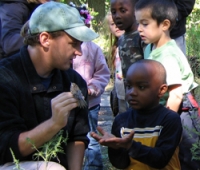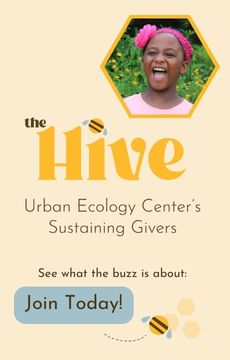One student realized that the plastic wrapped spork (yep - the hybrid of a spoon and fork), napkin and straw distributed in the school’s cafeteria created waste. After interviewing students, the kitchen manager and office staff, he could report that: 1) less than 1% of the students used straws, 2) wrapped sporks and napkins were more expensive than unwrapped, 3) the school could save thousands of dollars each year by distributing unwrapped individual napkins and sporks, and that 4) landfills have negative social impacts. If the school replaced the pre-packed set with bulk individual sporks and napkins, each day hundreds fewer plastic wrappings and straws would be sent to landfills, students would have tools they need to eat lunch and the school would save money: a win-win-win solution.
Another student handed us each a Hershey’s Kiss and presented equally compelling data on recycling aluminum foil. She and a partner worked on school-wide recycling process improvement strategies. As each student presented, it was clear they had learned and applied science concepts, mathematical applications, data visualization and communications skills.
Our job was to help the students finalize their projects. Mostly we asked questions, rather than giving advice, and came to understand that some of the projects would be implemented, presented to the student body and measured. Data-driven changes to processes would help the school become more economically, ecologically and socially responsible. We left feeling inspired and hopeful.
“Unsustainable Solution” was the headliner of the Business Journal three days later. Not a hopeful message. While the topic was not ecological in focus, it resonated with my Tuesday morning experience. The article explained that manufacturers were turning to expensive solutions, such as overtime pay, to fill the skills gaps left by an untrained workforce. I couldn’t help thinking that the students who had presented on Tuesday had the skills to fill those gaps. With a little experience and training, they could even improve the manufacturing processes. Toward the end of the article, Kurt Bauer, Wisconsin Manufacturers and Commerce president, called for a stronger connection to high school students to build a career pipeline that includes manufacturing options. Not a bad idea. But shouldn’t the learning start even earlier?
I was still reflecting on my experience at Carmen and our place in a career pipeline when I arrived a few days later at a Rotary lunch. A very good friend, David, approached me. He is the kind of rare good friend who is honest, always, and not afraid to share. So when he explained that he had feedback about the Center, I knew that what came next would be valuable, even if I didn’t want to hear it. I was right.
David volunteers as a reading coach at Brown Street Academy, a MPS public elementary school and partner of the Urban Ecology Center. After his class came to the Center he asked the students about their experience. “Did you learn something?” he asked.
“Yes,” replied a few of the students.
“What did you study?”
“Simple Machines” someone responded.
Ah-ha, David thought, now I can see if they really did learn something. “Tell me about simple machines” he posed.
“An inclined plane is a simple machine.” “So is a wheel and axle.” “And a wedge,” several students reply. “They make work easier...” Students chimed in, excitedly building upon each other’s explanations.
David was impressed by the amount of knowledge they retained and how eager they were to share it. Later he chatted with the teacher. She expressed deep appreciation for the Center. She shared that the hands-on application of these science concepts made learning come to life for her students.
Both David and I see the importance of investing in those children. Young students have the capacity to grow into bright high school students, like those at Carmen High, and eventually employees of the businesses vital to our city. It all connects. Learning is the heart of sustaining our city and our economy. Sustainable solutions start with learning, and the learning process is full of hope and promise.
Look around our website to discover the many ways in which you can get involved with the learning process at the Center. We’ll help students build skills that will bring hope and inspire confidence in a sustainable future.





